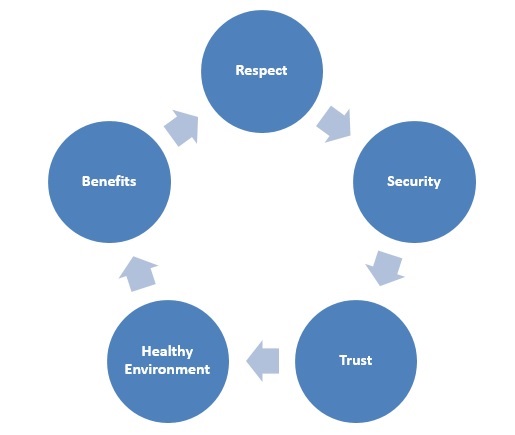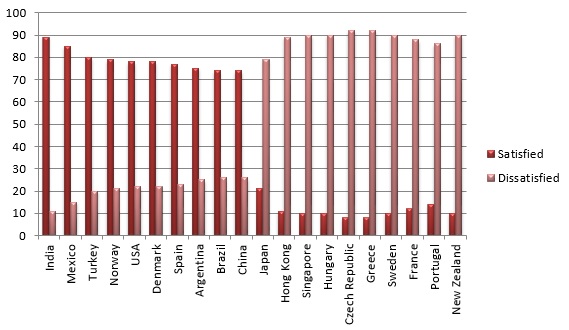
How Important is Job Satisfaction in A Workplace?
- Posted On : 12th July 2022
- Written By : Admin
“Pleasure in the job puts perfection in the work.” – Aristotle
Generally, most organizations struggle for employee satisfaction, but not all attain this goal. A worker's level of satisfaction with his/her employment is measured by job satisfaction. Measurements of the cognitive, emotional, and behavioural components of job satisfaction are available easily nowadays. Researchers have also found that different job satisfaction metrics vary in how much they capture thoughts or sentiments about the job.
It's crucial to keep in mind that each employee experiences job satisfaction differently. The elements that make one individual feel better about their employment might not be applicable to another individual in the same company under the similar circumstances.
This makes it vital to take a multifaceted understanding of employee satisfaction that addresses the following areas:
- The demanding nature of the job inspires workers to achieve new heights.
- A degree of comfort (convenient job location, access to the necessary digital means, and adaptable work hours).
- Regular gratitude from the top management and the entire organisation.
- Competitive wages that help workers retain a high standard of living.
- The assurance of career advancement in line with employees' goals for personal development.
Definitions of Job Satisfaction:
In simple words the degree of comfort employees experience with their jobs is known as job satisfaction. Beyond their regular responsibilities, this includes their relationship with co-workers and supervisors, their opinion of the organization's rules, and the effect their work has on their daily lives.
E.A. Locke stated, “Job satisfaction is a pleasurable or positive emotional state resulting from the appraisal of one’s job or job experience.”
Fieldman and Arnold stated, “Job satisfaction will be defined as the amount of overall positive affect or (feelings) that individuals have towards their jobs.”
According to Andrew Brin stated, “Job satisfaction is the amount of pleasure or contentment associated with a job. If you like your job intensely, you will experience high job satisfaction. If you dislike your job intensely, you will experience job- dissatisfaction.”
Keith Davis and Newstronx stated, “Job satisfaction is the set of favourable or unfavourable feelings with which employees view their work.”
Factors of Workplace Satisfaction

Five Important Factors Impacting Job Satisfaction
The factors that influence Job Satisfaction are as follows:
- Ideal working circumstances
- Opportunity for Growth
- Responsibilities and Task
- Connection with Managers and Colleagues
- Compensation
Ideal working circumstances: Employees like comfortable working environments because they make them feel better physically. People want to work in an environment that is both clean and healthy. The factors that affect job satisfaction include working hours, workplace cleanliness, ventilation, lighting, and noise levels, as well as the presence of the right technology and materials.
While the ideal working environment is overlooked and might not have a significant impact on job satisfaction. Dissatisfaction with one's job might be attributed to poor working circumstances.
Opportunity for Growth: When there is a clear path to progression, increased responsibility, and better salary that come with it, employees are more content with their existing position. Many employers urge staff members to develop more sophisticated abilities that will increase their chances of growth. For employees who participate in university courses, organisations at times cover the expense of tuition fee.
Responsibilities and Task: Even the most devoted worker may experience a decline in job satisfaction due to dealing with an excessive workload and impossible-to-meet deadlines. Missing deadlines causes disputes between team members and managers and increases work pressure.
This situation is frequently brought on by inefficient management and poor management. Because managers don't provide their personnel enough time to do their allocated jobs successfully or because there aren't enough qualified people, the workplace is constantly in a state of crisis.
Connection with Managers and Colleagues: Employees expect their co-workers and managers to treat them with respect. A hostile workplace, when co-workers or supervisors are impolite or harsh, is typically associated with decreased job satisfaction. Management needs to act and settle disputes before they evolve further into critical complications requiring legal measures. Employees might require a refresher on what actions are unacceptable while communicating with colleagues as well as managers.
Compensation: Job satisfaction is significantly influenced by wages and pay. This is primarily due to a few fundamental causes. First of all, money is a crucial tool for meeting necessities. Second, many workers believe that having money shows how much the management cares about them. Thirdly, because higher pay represents a greater level of commitment to organisational effectiveness, it is seen as a symbol of progress.

Credit: bit.ly/3yqxsGc
What is the significance of job satisfaction?
Following are some of the various and important points of consideration -
- Reduced turnover
- Increased productivity
- Improved client contentment
- Absenteeism among employees
- Benefits in generating higher revenues
- Employees who are satisfied help solving problems easily

Statistics: bit.ly/3AISNNW
Even though many might anticipate that the more industrialized and affluent nations would consistently rank highest for job satisfaction, that's not necessarily the case. Although many of these nations provide well-paying jobs in pleasant settings, they frequently come with strong managerial pressure and long hours, leading to stress and dissatisfaction. Well, it doesn’t really take much extra effort to keep employees happy. Job satisfaction is basically a two-way process. Employees need to feel gratified, and organizations must help employees understand their potential.
